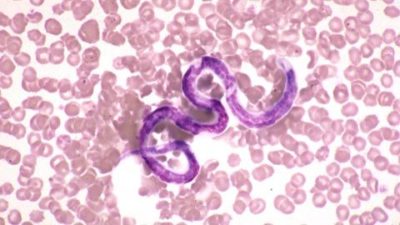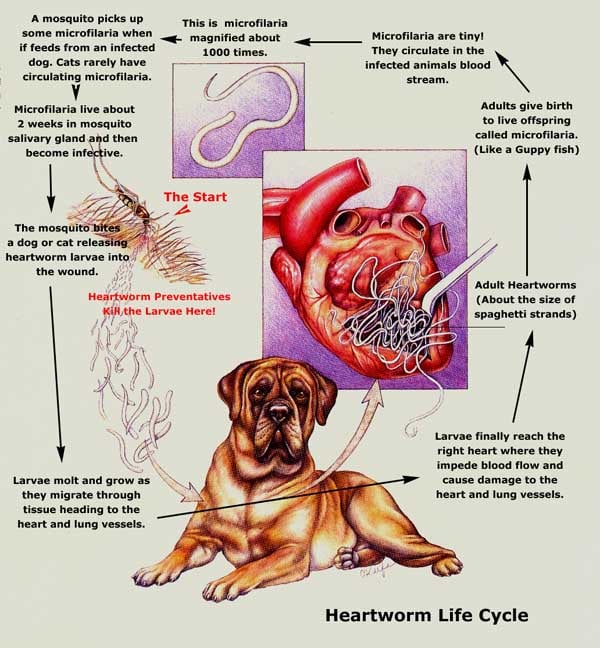A lot of people don’t know what a heartworm is, but the truth is that it’s exactly what it sounds like: a type of parasite that takes up residence in your pet’s heart, doing damage all the while. And though that kind of infestation seems like the type of thing that would be pretty evident, often you don’t see the signs of a heartworm infection until it’s progressed relatively far. That’s why prevention is key.
What do they do? How does my pet get them?
Heartworms are spread via mosquitoes. Here’s how the life cycle works:
A mosquito lands on a dog that’s heartworm-positive and feeds. The heartworm microfilariae (or larvae) are in the dog’s bloodstream and enter the salivary glands of the mosquito, where they can live for about 2 weeks. Once they bite a heartworm-negative dog, the microfilariae enter the new host, and begin molting and growing, and damaging internal tissue as they make their way to the heart and lungs. Once in heart, they begin to impede blood flow and cause damage to the heart and lung vessels.
Are all pets at risk?
Yes, though not all the same amount of risk. Dogs are natural hosts for heartworm, so they’re at the highest risk of infestation. Whether your dog is indoor or outdoor, all it takes is for one single infected mosquito to bite your dog. Keeping your dog off of prevention because they’re an indoor pet could be a fatal error, made all the worse because it was easily prevented.
Cats can also be infected with heartworms. But because they aren’t necessarily suitable hosts, some infections can clear up on their own (but not without possibly doing damage to the respiratory system). Heartworms in their bloodstream can cause difficulty breathing and other respiratory issues. Sometimes heartworms in cats go to other parts of the body, like the eyes, the brain, and the spinal cord. So while an infestation is less likely in cats, it’s no less dangerous, and they should be kept on preventative as well, especially because there’s no approved drug to treat heartworm in cats.
What about treatment for dogs?
By the time you realize that your dog has heartworms, the damage has already started. Treatment isn’t cheap, it isn’t easy on your dog, and even then, there can be lasting damage to heart and lung tissue. They may never be the same again. That’s why we’ll say again (and this is the last time) that prevention is key.
The treatment is a series of shots that kill off the worms piecemeal. The reason the treatment can’t be administered all at once is that the more dead worms are in the heart and bloodstream, the more likely it is for them to cause blockages. A staggered attack allows them time to break apart in the bloodstream and avoid complications.
An escalated heart rate can dislodge worms more easily and create additional blockages, and in addition, physical exertion increases the rate at which the worms do damage to tissue, so the moment you get a heartworm-positive diagnosis, it’s important to restrict activity as much as possible. For many people, this is the hardest part. Our friend Blu, for example, is a very sweet, high energy dog. Keeping her calm and still during the months of her heartworm treatment was incredibly difficult because she’s such a warm, sweet, loving pup. It’s hard to watch your friend be restricted in their movement, even if you know it’s the best thing for them (Blu’s A-OK, by the way, happy and healthy with her owner).
Prevention
Okay, we lied; we’re mentioning that prevention is key again, but can you blame us? All the details of the disease, of its symptoms, of the difficulty of treatment, all of that can be avoided by using prevention. We’ve adjusted our pricing recently to make buying large quantities of preventative as affordable as possible; we’re also working with our friends at Bayer to help combat rising heartworm numbers in the area. We’ve also seen too many hearts broken, too many families whose time was cut short because heartworms took hold and nobody knew.
So we’re pretty serious about it.
Please get your pet tested. Please put them on preventative; a monthly dose of Advantage Multi is all it takes to give you some peace of mind, and to give your pet their best chance at a long, healthy life. They deserve it, and they’re worth it.




I’m so glad that there is a treatment for heartworms, even if it isn’t cheap as you say. My friend’s dog started having problems and ended up having heartworms, so he had to go through treatment. I don’t want that to happen to my dachshund, so I will make sure we get preventative treatment right away!
Very glad your friend’s dog went through the treatment alright; it can be pretty stressful for both the pets and owners. And yes please, get your pup on some preventative! It’s so much more affordable to prevent than it is to treat.